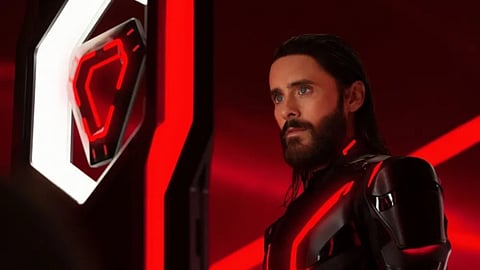Tron Ares Movie Review: Enough blemishes and brilliance for a cult following
Tron Ares Movie Review: Enough blemishes and brilliance for a cult following(3 / 5)
Tron is a version of a future long gone. Even before the Apple aesthetics, fears of AI dominance, and the implications of rapid cyberisation took over sci-fi, Tron extrapolated a world out of all of that, in its own unique way, inspired by the nascent stages of the digital world. And that unique signature on the science fiction genre has somehow survived and evolved through three visually stunning films. An argument could be made over whether Tron: Ares is better (or worse) than its predecessors, but it certainly deserves praise for preserving, and not debasing, the unique vibe of Tron. Ares strives its best to meet the impossibly high standards for the visuals set by Tron: Legacy. Every single visual grammar set by Tron: Legacy is recreated with reverence. This somehow paradoxically becomes the reason Tron: Ares fails to surpass Tron: Legacy. There is no innovation, just clever yet minor iterations. Nine Inch Nails try their best with a meditative, non-formulaic soundtrack, but it barely touches the magnificence of what Daft Punk achieved in Tron: Legacy. In some cases, shots are designed just so they can recreate a moment from the earlier film, like when Eve Kim (Greta Lee) jumps her Light Cycle over an underpass in the same way Sam Flynn (Garrett Hedlund) does with his motorbike in the opening scene of Tron: Legacy. All the shallow attempts at ‘homages’ are forgotten because the camera angles, the soft neon hues, the sterile melancholic softness of the world, are so undeniably Tron and incredibly alluring.
Director: Joachim Rønning
Cast: Jared Leto, Greta Lee, Evan Peters, Hasan Minhaj, Jeff Bridges
Tron: Ares is essentially a long battle between two tech companies that gets out of hand. Dillinger Systems, headed by the impulsive, reckless Julian Dillinger (Evan Peters), and ENCOM’s CEO, the level-headed genius Eve Kim (Greta Lee), are doing everything they can to get their hands on the ‘permanence code,’ which removes the 29-minute degeneration time limit for anything/anyone brought out of the digital world into our reality. The game changer is Dillinger System’s super-intelligent security program, Ares (Jared Leto). Tron: Ares suffers from a number of issues that leave us wondering how such portions and the best-written parts could co-exist in the same film. A lot of characters had to make questionable decisions for the story to march on. It’s all for the greater good, I guess. Perhaps the biggest argument against the film is how it fails to create any strong emotional connection. The things unfolding on screen are fascinating, and it's exciting to ponder the many themes being presented. But it's hard to care or empathise with the big life-changing decisions these characters make. Fine, Eve decides to help Ares because he has read all her personal files, so he knows her better, but it sure seems like she arrived at that decision too soon, considering how Ares was just hunting her down not long ago. The biggest, most popular cliche in a film about robots/Artificial Intelligence is when they suddenly develop feelings/emotions and want to be ‘human’, and in that pursuit, they demonstrate exceptional virtues like empathy, kindness, and a willingness to sacrifice themselves. We do see Ares exhibiting these traits on his journey to become ‘human’, but it happens in a subtle and nuanced way, with Jared Leto taking a wonderfully restrained approach to his performance. Ares isn’t going through a big mental breakdown, or is running from the law, nor is he struggling to handle his newfound feelings of love for a human woman. Ares handles his emerging humanity with considerable curiosity. Why did the rain intrigue him? Why would he go against his creator’s command? Why did he hesitate to leave a wounded program behind? Why did he fight so hard to attain ‘permanence’, and why was he willing to sacrifice that to save someone?
The answers unravel during a pivotal scene towards the end of the film, where Ares meets a remnant of Kevin Flynn’s consciousness inside an early, retro version of the digital world. Ares says he prefers the 80s British Electronic band, Depeche Mode, over Mozart, who is considered the greatest composer of all time. He says he understands that it is silly to think Depeche Mode is better than Mozart. And then he hesitates before saying, “I struggle to explain my love for Depeche Mode,” to which Flynn smiles. And that is the philosophical essence of the film. Ares doesn’t turn human the moment he feels ‘love’, but when he realizes that he cannot fully comprehend the vastness of that complex, mildly irrational experience. Towards the end, Ares chooses to travel around the world, after realising that there is beauty in trying to unravel this mystery, and that, by itself, is part of the human experience. Tron: Ares has enough of such interesting philosophical themes, which somehow exist along with surprisingly straightforward issues. These contradictory forces are wrapped up in a visual spectacle, which will get the film noticed for long enough for the issues to be forgotten, for the deeper themes to be noticed, appreciated. And that is how Tron: Ares will attain its 'permanence code' and become a cult classic, just like its predecessors.

